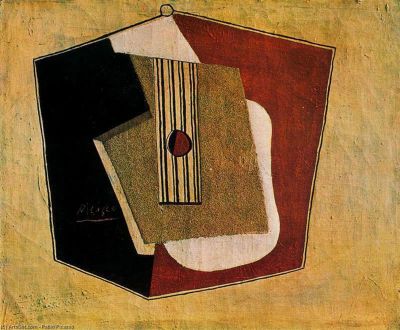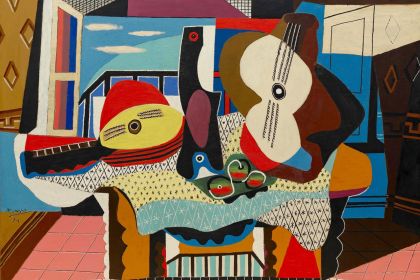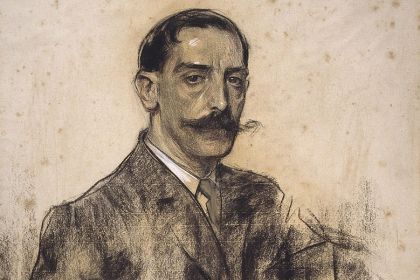Classical Guitar
Moreno Torroba as the first-ever Spanish non-guitarist who composed for solo guitar

The Guitar by Pablo Picasso
Federico Moreno Torroba was a Spanish composer adored by his contemporaries largely for his stage works, especially the ones written in the zarzuela genre, a form of light Spanish opera. However, Torroba's current popularity is linked to his extensive contribution to the classical guitar repertoire, earning him the recognition of one of the best leading twentieth-century composers to have ever written music for the instrument.
In his career spanning over sixty years, Torroba has composed nearly one hundred guitar pieces that thematically developed the rich traditions of flamenco music while at the same time re-framing them in classical musical forms.
Torroba was not a guitarist, and his decision to write for guitar crystallized after meeting the iconic Spanish guitar maestro Andrés Segovia. Segovia was known not only as a brilliant performer but also as a motivator who prompted a number of composers, including Joaquín Turina, to replenish the guitar repertoire with modern works based on the folk music of his homeland.
In his autobiography, Segovia mentions the first meeting with Torroba organized after the 1920 Madrid premiere of one of his orchestral works. That evening Segovia asked the composer to write something for guitar and within a few weeks, Torroba completed his first guitar work Danza in E major.
Listen to Torroba's Danza in E major from Suite Сastellana performed by John Williams:
Segovia noted that Torroba wrote his Danza on pure instinct since, at that time, he had only a superficial understanding of the performing techniques for the guitar, but this work greatly delighted Segovia and it cemented its place in his concert repertoire. Moreover, Segovia considered Torroba's composition to be a true breakthrough for the classical guitar and stated that this was "the first time a composer who was not a guitarist wrote for the guitar".
Subsequently, Danza became the third part of Torroba's Suite Castellana, joining the other components of the suite, the Fandanguillo and the Arada.
Listen to Torroba's Fandanguillo from Suite Сastellana performed by Andrés Segovia:




Unfortunately your title is entirely mistaken, false and misleading. Respighi's piece predates Torroba by a decade, and while Segovia was thinking of solo repertoire, a number of 19th century composers wrote for guitar as part of the orchestra e.g. Mahler.
it fixed now, thank you!
Well... you haven't fixed it as far as I can see, because it still peddles the erroneous statement 'for solo guitar'. The Respighi piece was for solo guitar, and predates Torroba.
Interesting article. However, the content is confusing, as Segovia's recording given as an example plays the first part of the suite, Fandanguillo, and not the actual Danza. Moreover, apart from being inaccurate, Segovia's claim about Torroba being the first non-guitarist to write for the guitar is very controversial, as it lies open his low opinion and limited knowledge about the work of the guitarist composers, an attitude which has been fortunately left behind by younger generations. Ironically enough, there is a (rhetorical) question worth being asked: do you know any relevant composition for piano written by a non-pianist?
Thank you for the insightful comment. I have edited the title to denote the composition was for the solo guitar, not the guitar with orchestra. Also included the correct piece of music, unfortunately hadn't thought to check the initial video properly, trusting the YouTube tags. As for Segovia's claim, I admit there is plenty left to unpack regarding his outlook and a certain degree of ignorance. If you have any detailed information of non-guitarist composers and their influential contribution for the solo guitar (for example, Schubert and Berlioz wrote for guitar with orchestra pre-Torroba but not for solo), I'll be glad to include it in a separate article or as an edit to this one.
PS forgot to mention, the Falla Homenaje was also written in 1920, so unless you have concrete dates for the composition of each, it would seem only honest to admit that there is a 50/50 chance which one was the earlier. And that's not to mention the Respighi, which *was* earlier, albeit almost entirely unknown.
PPS the original publication (https://imslp.simssa.ca/files/imglnks/usimg/8/84/IMSLP229164-PMLP04187-F...) is dated "8-20" at the end.
Yes, Falla's Homenaje was on our radar, but it was written at least half a year after Torrega's piece according to the information from the 'Federico Moreno Torroba: A Musical Life in Three Acts':
It's likely that Segovia wasn't familiar with Respighi's 'Variazioni per chitarra', and according to this source the title was an educated guess made from "a manuscript of an untitled piece in Respighi's hand; appeared to be a kind of theme and variations, probably composed for guitar between 1900 and 1909." However, the title of this article has been edited to focus on Spanish composers to respect Respighi's contributions (and of other non-Spaniards).